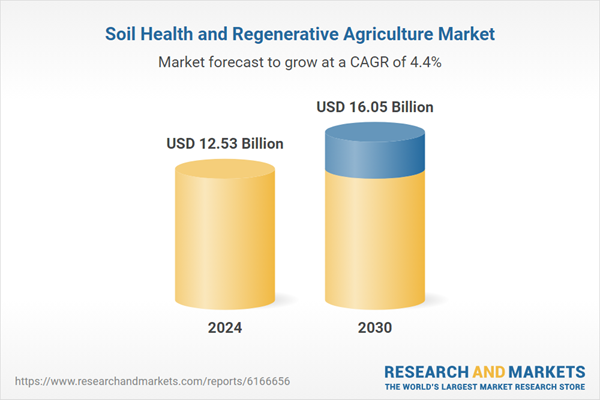Speak directly to the analyst to clarify any post sales queries you may have.
10% Free customizationThis report comes with 10% free customization, enabling you to add data that meets your specific business needs.
Key drivers fueling market expansion include the rising demand for organic and sustainably produced food, growing concerns over soil degradation and fertility loss, and heightened regulatory focus on environmental protection. Despite the promising outlook, the market faces challenges such as high initial investment costs, fragmented farming systems, and the need for extensive farmer education and training to implement regenerative practices effectively.
Key Market Drivers
Growth in Agriculture Industry
The ongoing growth of the agriculture industry is a pivotal driver for the global soil health and regenerative agriculture market. The gross production value of the agriculture market reached USD 4.82 trillion in 2025, while imports totaled USD 939.5 billion during the same period. As the demand for food production intensifies due to population growth and changing dietary preferences, there is increasing pressure on agricultural systems to enhance productivity while maintaining environmental sustainability.Over the past five decades, soil degradation has resulted in the loss of 70% of the world’s agricultural supply. Furthermore, soil degradation contributes to external challenges such as sedimentation, climate change, impaired watershed function, and alterations to natural habitats, leading to a decline in genetic resources and biodiversity. This expansion in agriculture has heightened awareness of soil degradation issues, including nutrient depletion, erosion, and loss of organic matter, which directly impact crop yields and long-term farm viability. In response, farmers, agribusinesses, and policymakers are actively adopting regenerative agriculture practices that focus on restoring soil health, improving biodiversity, and promoting sustainable land management.
Key Market Challenges
High Initial Costs and Financial Risks
One of the significant challenges confronting the global soil health and regenerative agriculture market is the high initial costs and associated financial risks involved in adopting these sustainable farming practices. Transitioning from conventional agriculture to regenerative methods often requires substantial upfront investment in new equipment, soil amendments, cover crops, and technology such as precision agriculture tools. For many farmers, particularly smallholders and those operating in developing regions, these capital expenditures can pose a considerable financial burden.Moreover, the financial risks extend beyond initial costs. Regenerative practices may require several seasons before yielding measurable improvements in soil health and crop productivity, creating a period of uncertainty regarding returns on investment. This lag can strain cash flow and operational budgets, discouraging widespread adoption, especially among farmers with limited access to credit or financial support.
Key Market Trends
Carbon Sequestration and Emerging Carbon Credit Markets
Carbon sequestration refers to the process of capturing and storing atmospheric carbon dioxide in soil organic matter through regenerative agricultural practices such as cover cropping, reduced tillage, agroforestry, and enhanced crop rotations. In 2023, the projected CO₂ capture capacity for 2030 increased by 35%, while announced storage capacity grew by 70%. As a result, the total expected CO₂ capture capacity by 2030 reached approximately 435 million tonnes per year, with storage capacity rising to around 615 million tonnes annually.These practices not only improve soil fertility and biodiversity but also serve as a natural mechanism to reduce greenhouse gas concentrations, thereby addressing climate change challenges.
The commercial potential of carbon sequestration is being unlocked through emerging carbon credit markets, which incentivize farmers and landowners by monetizing the carbon stored in their soils. These markets enable stakeholders to generate tradable carbon credits verified through rigorous measurement, reporting, and verification (MRV) frameworks. By participating in these schemes, agricultural producers can access new revenue streams while contributing to global decarbonization goals.
Key Market Players
- Cropin
- Field to Market
- Indigo Ag, Inc.
- Soil Capital Ltd.
- Ceres AI
- Agreena
- Trace Genomics
- Regrow Ag
Report Scope
In this report, the Global Soil Health and Regenerative Agriculture Market has been segmented into the following categories, in addition to the industry trends which have also been detailed below:Soil Health and Regenerative Agriculture Market, By Practice Type:
- Soil Health Management
- Water Management
- Biodiversity Enhancement
- Nutrient Management
- Livestock Grazing Management
Soil Health and Regenerative Agriculture Market, By Application:
- Crop Production
- Livestock Grazing
- Forestry
Soil Health and Regenerative Agriculture Market, By Region:
- North America
- United States
- Canada
- Mexico
- Europe
- France
- United Kingdom
- Italy
- Germany
- Spain
- Asia Pacific
- China
- India
- Japan
- Australia
- South Korea
- South America
- Brazil
- Argentina
- Colombia
- Middle East & Africa
- South Africa
- Saudi Arabia
- UAE
Competitive Landscape
Company Profiles: Detailed analysis of the major companies present in the Global Soil Health and Regenerative Agriculture Market.Available Customizations:
With the given market data, the publisher offers customizations according to a company's specific needs. The following customization options are available for the report.Company Information
- Detailed analysis and profiling of additional market players (up to five).
This product will be delivered within 1-3 business days.
Table of Contents
Companies Mentioned
- Cropin
- Field to Market
- Indigo Ag, Inc.
- Soil Capital Ltd.
- Ceres AI
- Agreena
- Trace Genomics
- Regrow Ag
Table Information
| Report Attribute | Details |
|---|---|
| No. of Pages | 185 |
| Published | August 2025 |
| Forecast Period | 2024 - 2030 |
| Estimated Market Value ( USD | $ 12.53 Billion |
| Forecasted Market Value ( USD | $ 16.05 Billion |
| Compound Annual Growth Rate | 4.4% |
| Regions Covered | Global |
| No. of Companies Mentioned | 8 |









